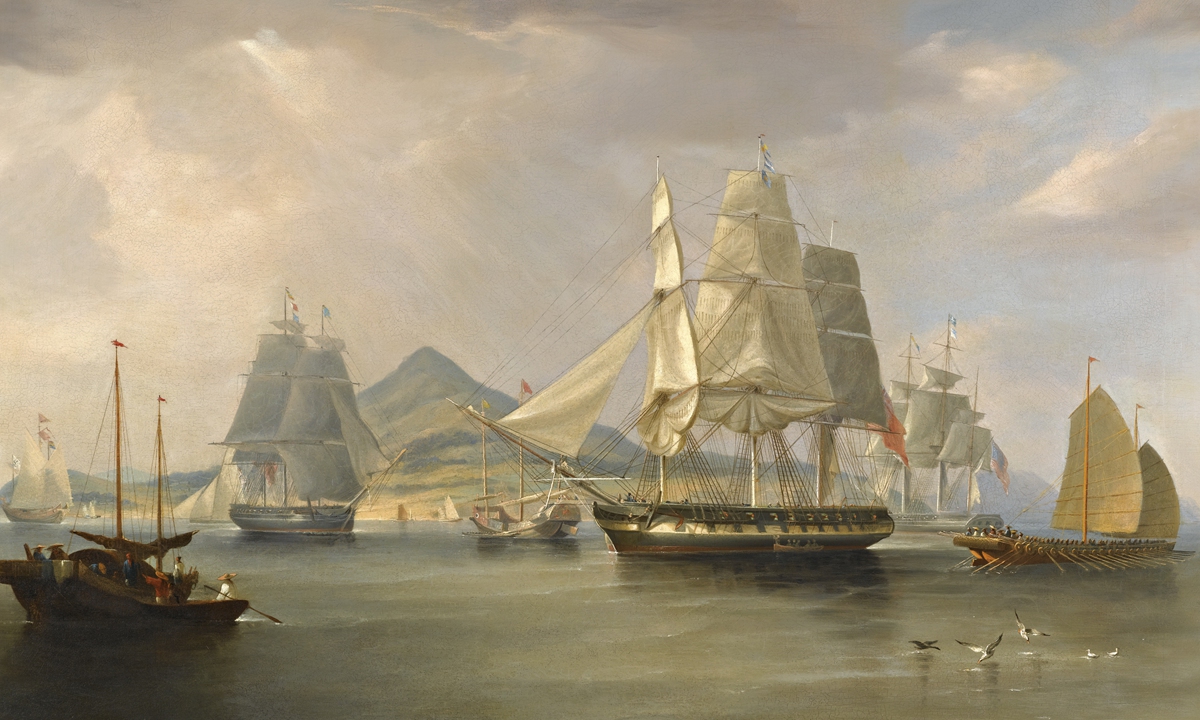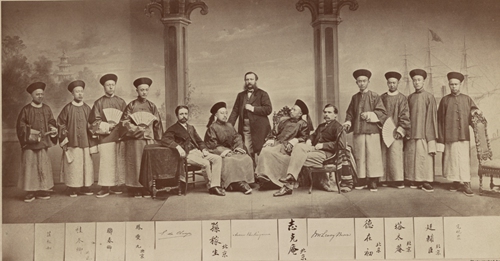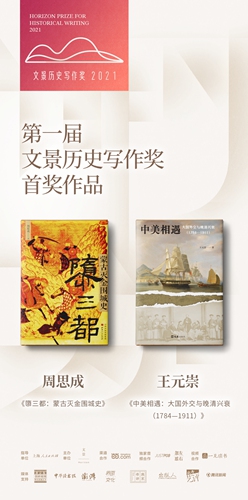ARTS / BOOKS
Chinese professor reflects on history of China-US relations in new book
First contact

Opium ships at Lintin, China by British artist William John Huggins Photo: Courtesy of Wang Yuanchong

Anson Burlingame (center), US diplomatic minister to China, poses for a photo with officials of the Qing Dynasty Photo: Courtesy of Wang Yuanchong

Cover of the new book Photo: Courtesy of Wang Yuanchong
In 1843, US President John Tyler wrote a letter to the Daoguang Emperor of the Qing Dynasty (1644-1911), referring to himself as a "good friend" in his signature. This was the first time a US president had written to a Chinese emperor.
However, the emperor read a translated version of the letter and did not see any mention about the "good friend." His reply was in the tone of an imperial edict to a vassal, but through the translation, the president saw a friendly letter from a "good friend."
This is true historical recording in the history book Zhongmei Xiangyu (lit: Meeting of China and the US) written by Wang Yuanchong, as assistant professor at the University of Delaware in the US.
When China and the US first began communicating with each other, the two countries knew little about each other, so the mental image of each other and factors such as the language barrier gradually caused many conflicts, severely impacting bilateral relations.
The book collects and records the collisions and developments, misunderstandings and breakthroughs between China and the US from the late Qing Dynasty to the 1911 Revolution.
The Chinese book published by the Wenhui Press in Shanghai in January, 2021 was awarded the first Horizon Prize for Historical Writing 2021 at a ceremony in Beijing on January 8. The award is the first of its kind in China.
"Wang Yuanchong uses his teaching experience to optimize public writing and responds to the significant issue with flourished historical details rarely seen before," the judging panel wrote in the recommendation for Wang's book.
"When America's first merchant ship to trade with China, Empress of China, arrived in Guangzhou in 1784, the two countries knew little about each other and it took a long time for the two countries to become familiar, so I chose 'meeting' as the title of this book to describe the history of communication," Wang told the Global Times via email, adding that "the title does not mean conflicts did not take place at that time between each other."
Looking back
The interaction between China and the US during the Qing Dynasty foreshadows the present world. Wang said that the historical relations between the two should inspire the China and US of today to strengthen communication and improve understanding.
Bilateral relations between the Qing and the US started with trade. Chinese historian Song Nianshen pointed out that diplomatic issues between the two countries, including trade wars, has not been limited to the 21st century, but have deep historical roots, Sohu News reported.
The book notes that since its birth, the US has had a "sense of mission" to "spread advanced civilization," which is called "Manifest Destiny" in US history textbooks.
How the US treated the Qing Dynasty more than 200 years ago was based on that sense, and today it still uses this sense when dealing with other countries.
Such behavior as discriminating against Chinese people and protecting the trade status of the US also originated from interactions with the late Qing Dynasty, which was the product of the combination of its inherent historical view and the goal of pursuing economic interest.
Compared with local history taught at school, Wang told the Global Times that the educational system of kindergarten to the 12th grade in the US doesn't spend much time covering the history of other places around the world. "For example, Asia as a region just has a very small proportion in the basic education system in the US. The histories of Asian countries such as China, Japan and Iran are all only brief outlines in textbooks of American students," Wang said.
He added that US history courses focus on US and European history, which can affect their understanding of other parts of the world.
"I think it's partly because of European colonialism."
The book reflects that because most Americans lack an understanding of Chinese history and reality, and are bound by fixed concepts from the 18th and 19th centuries, many acts of demonizing and hostility toward China are able to easily attract supporters.
Seeing the world in a drop of water
Wang said that his book covers a part of his seminar about the history of bilateral relations between China and the US at his university.
He created the seminar in 2016 as he found that many people knew only a little about the two countries' current relations and even less about past relations in previous times.
Wang selected influential historical events for the book and arranged these incidents chronologically.
The book has an 8.7/10 on Chinese media review platform Douban. Many readers have remarked that the details presented in the book are vivid and interesting.
The first time that Empress Dowager Cixi called in the wives of foreign ministers is one of stories in the book being talked about the most. The book also records that the women rode a train pulled by people in Cixi's royal garden.
Presenting a broad issue about diplomatic relations through details happening in the history is an angle that the writer wants to show to the readers. "There may not be the whole world in a drop of water, but the world can be observed in a drop of water," Wang said.




